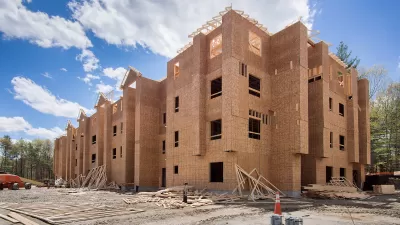Higher taxes on high-value property sales are being considered in Chicago, Connecticut, and Washington state as a way to address the housing crisis.

One-time fees on the sale or purchase of property, often called real estate transfer or real estate excise taxes, are nothing new. As Kevin Hardy explains for Stateline, such fees have been a fixture of many tax codes for decades. “But local and state governments are increasingly looking to create a ‘mansion tax’ targeting the higher ends of the real estate market” with the aim of tackling the growing housing crisis, he writes.
To date, 16 cities and counties and seven states have approved that type of tax, many with the intent of putting the revenue to building affordable housing. Though not without pushback. The approach has led to litigation in Santa Fe and Los Angeles. But that’s not stopping other cities and states from considering it, including Chicago, Massachusetts, and Washington state, according to the Stateline article.
In March, “Chicago voters will decide whether to approve Democratic Mayor Brandon Johnson’s Bring Chicago Home referendum, which would increase the real estate transfer tax on expensive properties. And legislators in Massachusetts are weighing a bill that would allow cities to impose their own real estate transfer fee,” Hardy reports. Washington state lawmakers are also considering a bill that would increase the tax on property sales above $3 million, while decreasing it for less expensive sales.
FULL STORY: If you can buy a ‘mansion,’ you can pay a tax for affordable housing, these states say

Alabama: Trump Terminates Settlements for Black Communities Harmed By Raw Sewage
Trump deemed the landmark civil rights agreement “illegal DEI and environmental justice policy.”

Planetizen Federal Action Tracker
A weekly monitor of how Trump’s orders and actions are impacting planners and planning in America.

The 120 Year Old Tiny Home Villages That Sheltered San Francisco’s Earthquake Refugees
More than a century ago, San Francisco mobilized to house thousands of residents displaced by the 1906 earthquake. Could their strategy offer a model for the present?

In Both Crashes and Crime, Public Transportation is Far Safer than Driving
Contrary to popular assumptions, public transportation has far lower crash and crime rates than automobile travel. For safer communities, improve and encourage transit travel.

Report: Zoning Reforms Should Complement Nashville’s Ambitious Transit Plan
Without reform, restrictive zoning codes will limit the impact of the city’s planned transit expansion and could exclude some of the residents who depend on transit the most.

Judge Orders Release of Frozen IRA, IIJA Funding
The decision is a victory for environmental groups who charged that freezing funds for critical infrastructure and disaster response programs caused “real and irreparable harm” to communities.
Urban Design for Planners 1: Software Tools
This six-course series explores essential urban design concepts using open source software and equips planners with the tools they need to participate fully in the urban design process.
Planning for Universal Design
Learn the tools for implementing Universal Design in planning regulations.
Clanton & Associates, Inc.
Jessamine County Fiscal Court
Institute for Housing and Urban Development Studies (IHS)
City of Grandview
Harvard GSD Executive Education
Toledo-Lucas County Plan Commissions
Salt Lake City
NYU Wagner Graduate School of Public Service





























